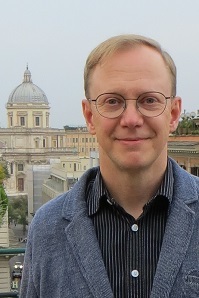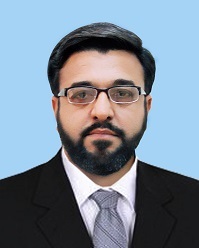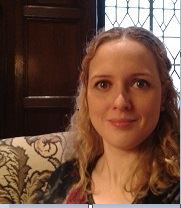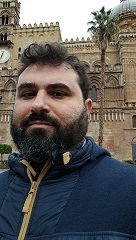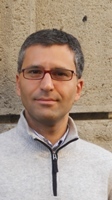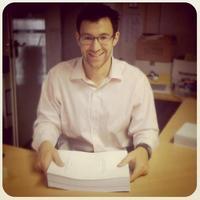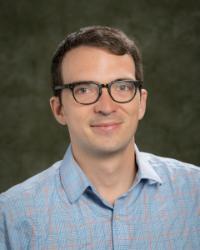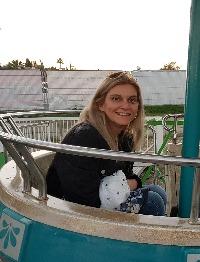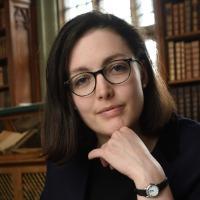Past IMEMS Library Fellows
Gašper Jakovac
1 May 2019 – 1 June 2019
Poems, Songs, and Ballads in Hunter Manuscripts
Gašper Jakovac specializes in early modern drama, provincial entertainment, and post-Reformation Catholic culture in England. He was a doctoral researcher on the AHRC-funded Records of Early English Drama North-East project at Durham University (2014–2018). From January 2015 to December 2016, his studies were also supported by the Gerda Henkel Stiftung. His research has recently been published in British Catholic History.
As an IMEMS Library Fellow, he conducted research on seventeenth-century poems and songs from the manuscript collection of Durham antiquarian Christopher Hunter (1675-1757). A number of compositions on religious and polemical subjects collected by Hunter are original and of local provenance. Gašper attempted to establish their authorship, performance history, and significance in relation to contemporary religious controversies, examining in particular their (anti-)Catholicism.
Janne Skaffari
30 April 2019 - 29 May 2019
Multilingual Practices in Manuscripts from the Long Twelfth Century
Janne Skaffari, senior lecturer in English language and linguistics at the University of Turku, Finland, has worked on the language and texts of post-Conquest England both before and after earning his doctorate last decade. The primary focus of his research is on language contact and its consequences, including both adoption of loanwords and code-switching between two or more languages; the latter has gained prominence in historical linguistics in the last few years. Some of Janne’s recent work has been published in the volume Multilingual Practices in Language History: English and Beyond, edited by Pahta, Skaffari and Wright (2018).
At Durham, Janne Skaffari examined manuscripts from the twelfth and thirteenth centuries, a period with relatively little vernacular text production in England. The manuscripts contained evidence of interaction between Latin and English but had not yet been examined within the framework of historical code-switching research. Several of them were religious texts in Latin that contained small amounts of English, including verse and glosses. Skaffari's examination shed new light on the multilingual practices of the period with careful consideration of the manuscript context of the language-switches, including their intra-textual translations into the main language and verbal and visual flagging of the embedded language.
Abdul Azeem
1 April 2019 – 26 April 2019
Contextualising Sir John Marshall’s Photographic Collection at Durham
Abdul Azeem has done his PhD on “Classification and stylistic analysis of Zar Dheri sculptures (Shinkiari-Hazara)” from Taxila Institute of Asian Civilizations, Quaid-i-Azam University, Islamabad – Pakistan under supervision of eminent archaeologist of Pakistan, Prof. Dr. Muhammad Ashraf Khan. His PhD thesis brings forth to light the dominant influences of Buddhist art of Swat (ancient Uddhiyana) on the sculptures of Zar Dheri, Shinkiyari, district Mansehra in Hazara Division of Khyber Pakhtunkhwa in Pakistan through diversified approach including analytical and comparative studies of sculptures from different areas of the ancient land of Gandhara. By virtue of educational background and practical training, he is more inclined to the study of Gandhara art in general and the study of the Buddhist religious and secular establishments in the greater Taxila Valley and the sculptures from this area. He has taken part in many important archaeological excavations in the Taxila Valley and has also been the Officer-in-Charge of the monuments and sites in the valley for many years in his position as the Head of the Sub-Regional Office, Department of Archaeology and Museums, Peshawar expanding jurisdiction from Gilgit-Baltistan through Khyber Pakhtunkhwa to Taxila Valley.
He has diversified experience by virtue of his postings at different positions including Head of the National Museum of Pakistan that houses the choicest collection of Gandhara art and overall In-charge of Swat Museum. He has in-depth study of the collection of Peshawar Museum housing one of the best and largest collection of Gandhara art and that of Lahore Museum also housing some of the best pieces of Gandhara art. He stayed at Taxila for quite long during archaeological excavations at Hathial, Bhir Mound and Monastic Complex of Badalpur and has been a regular visitor to the Buddhist establishments in the Taxila valley for their study and evaluation of their state of preservation. As a keen follower of Sir John Marshall who pioneered extensive archaeological excavations in Taxila Valley, he takes great interest in his research and the sites explored and excavated by the great archaeologist.
For his Post-Doctorate study titled “Contextualising Sir John Marshall’s Photographic Collection at Durham”, he studied the precious and large photographic collection presently preserved in Durham University. This was a very unique opportunity for him to examine these photographs taken almost a century from now when Sir John Marshall was conducting archaeological excavations in the Taxila Valley. Azeem compared the state of preservation of the archaeological sites at the time of Marshall with present state of preservation of these sites.
Eilish Gregory
1 May 2018 - 1 June 2018
Catholic Integration in English Society, 1642-1689
Eilish Gregory did her undergraduate and master degrees at the University of Kent before moving to University College London for her early modern history doctorate. Her thesis, ‘Catholics and Sequestration during the English Revolution, 1642-60’, explored how Parliament’s policy towards English Catholics altered during the English Revolution by examining their experiences of the sequestration and compounding system. The thesis analysed how Catholics accessed guidance on how to manoeuvre themselves through the new sequestration and compounding process, and scrutinised how Catholic petitioners utilised their networks with influential Protestants. Through these networks, it was revealed that moderate politicians were temperate towards Catholics of social privilege, and established that English Catholics were not the primary focus of sequestration during the English Revolution, but that the legislation focused instead on those who were deemed a political threat to the Commonwealth. A chapter on Catholics and Catherine of Braganza entitled ‘Queen Catherine of Braganza’s Relationship with her Catholic Household in Restoration England’, will be published later in 2018 in the edited volume Forgotten Queens in Medieval and Early Modern Europe: Political Agency, Myth-Making, and Patronage.
At Durham, she scrutinised the family papers of leading northern Catholic magnates, which included the Kennett, Radclyffe, and Derwentwater papers, as well as official documents for the north-east of England. The project examined how the English Catholic community participated in local and national society from 1649 until 1689. Firstly, she analysed how Catholic and Protestant relationships functioned by examining the extent to which Catholics were punished for religious reasons. Secondly, focused on how gentry Catholics demonstrated their loyalty as English subjects by examining how they participated in their communities through roles such as commissioners of sewers when Catholics were barred from holding official roles because of their religion. By examining the English Catholic community she revealed the extent to which Catholics integrated within seventeenth century society, and demonstrated how relationships with Protestants and fellow Catholics developed across the period.
Giuseppe Guazzelli
3 April 2018 - 4 May 2018
A Martyrology in its context: Durham Cathedral Library, Ms. B. IV. 24
Giuseppe A. Guazzelli completed his “Dottorato di Ricerca” in Religious History at Univesity “La Sapienza” in Rome in May 2015 with a thesis entitled Liturgia, Tempo dei Santi, Historia Sacra: i primi martirologi a stampa (1475-1584). His research explored the history and the development of the Martyrology, namely a liturgical book listing day by day the faestdays of the saints, during the transition from the manuscript to the print. For the years after the Reformation he concentrated above all on Catholic Martyrologies. The main achievements of his research are published in A. K. Frazier (Ed.), The Saint between Manuscript and Print: Italy 400-1600, Toronto 2015.
During Guazzelli's stay in Durham in April 2018, the one-month IMEMS Library Fellowship allowed him to deepen the study of the Durham Cathedral Library Ms. B.IV.24, the so-called “Durham Cantor’s Book”. The codex contains several items: a Calendar, but without saints’ names; a Martyrology; a Lectionary of chapter gospels; Lanfranc’s Constitutiones; the Regula Benedicti both in Latin and in Anglo-Saxon. In his research, Guazzelli gave special attention to the proper Martyrology (Ms. B. IV. 24, ff. 12v-39r).
Anna Reynolds
16 March 2018 16 April 2018
Binding Waste in Early Modern England
Anna Reynolds submitted her PhD ‘Privy Tokens: Wastepaper in Early Modern England’ at the University of York in 2017. Her research uncovers the use of wastepaper as a material practice and as a figurative resource in the sixteenth and seventeenth centuries, situating extant repurposed pages alongside the tropes and metaphors in a range of texts. Her interests include the work of Martial, Thomas Nashe, John Taylor, Thomas Middleton, and Thomas Urquhart, and the broader concerns of book destruction, book collection, and the archive. Her more recent research explores the relationship between paper, almanacs, and the human body in the early modern period, and the cultural history of waste fragments as they were collected, dispersed, and archived between the sixteenth century and the present day. Her article, ‘Such Dispersive Scattredness: Early Modern Encounters with Binding Waste’, has been published in the Journal of the Northern Renaissance (2017).
During her time at Durham, she surveyed the binding waste extant in the Bamburgh, Cosin, Routh, and Ushaw libraries. By examining the materials used as waste (monastic fragments, contemporary documents, printed waste, and, by the late seventeenth century, damasked waste sheets) and the binding format (wrappers, flyleaves, pasteboard, guards), she seeked to outline a chronology and pattern of repurposing in the early modern period. Attention to printers, binders, and book-buyers who made particularly persistent use of repurposed pages provided evidence of a widespread English, and often trans-European, wastepaper trade.
Matteo Binasco
1 September 2017- 30 September 2017
"The Convento dos Inglesinhos". A new assessment of the English College of Lisbon and its connections with the other English Colleges on continental Europe
After completing his BA in history at the University of Genoa, Matteo Binasco earned his Masters degree at Saint Mary's University of Halifax in Canada. He completed his PhD in history at the National University of Ireland in Galway. He has been a short-term fellow at the Institute of Canadian Studies in Ottawa and a fellow at the John Carter Brown in Providence. From February 2010 - January 2013 he was research fellow at the Istituto di Storia dell'Europa Mediterranea of Italy's National Research Council (Consiglio Nazionale delle Ricerche). Since mid-September of 2014 he has been a post-doctoral research fellow at the CUSHWA Center for the Study of American Catholicism at the Rome Global Gateway, University of Notre Dame.
Dr Binasco's main area of interest is the development of the clerical networks within the Atlantic area during the early modern period. He authored Viaggiatori e missionari nel seicento, edited Little do We Know,and has published thirty-one articles and essays. He is also currently completing a guide to the material on American Catholicism contained in the archives and libraries of Rome. The research award offered by the IMEMS allowed Matteo to consult the relevant material pertaining to the English College of Lisbon. This is a crucial step in order to examine this still-unknown institution, and how it succeeded to establish a missionary network with the other English Colleges on Continental Europe during the early-modern period.
Derek Dunne
24 April 2016 - 24 June 2016
Rogues’ Licence: Counterfeiting Authority in Early Modern Literature
Derek Dunne is the author of Shakespeare, Revenge Tragedy and Early Modern Law: Vindictive Justice (Palgrave, 2016). This project carries the working title Rogues' Licence: Counterfeiting Authority in Early Modern England, with a planned monograph on Shakespeare's Licence: The Power of Paperwork in Early Modern Literature & Culture.
The project combined archival research on early modern licences and related documents with analysis of literary texts in terms of forgery, counterfeiting, and discourses of authority. Elizabethan and Stuart plays had to be licenced for performance, and works of literature needed a licence before going to print. While this historical fact is known, this research uses it as an interpretive entry-point into the nexus between government bureaucracy and literary production for the first time. At once a material condition of print or performance and a metaphorical promise of excess, the licence is shown to be a defining document of early modern English culture.
The holdings at Durham Cathedral and the Durham University’s special collections offered unprecedented access to a variety of pre-modern paperwork not usually preserved. This greatly enhanced the material basis so crucial to this research project.
Liam Temple
10-21 April 2016 and 1-12 May 2016
Mysticism among the English Poor Clares, 1580-1680
Liam Temple completed his PhD in History at Northumbria University in January 2016 with a thesis entitled ‘Holy and Peculiar People: Mysticks and Mystical Theology in England, 1605-1705’. His research explores examples of both Protestant and Catholic mysticism in the seventeenth century, drawing particular attention to the way mysticism encouraged overlap and dialogue between the two confessions. He has published two journal articles concerning mysticism in Women’s Writing and British Catholic History and also has a chapter in a forthcoming collection entitled Protestants and Mysticism in Reformation Europe.
During his fellowship, Liam focussed on the seventeenth-century manuscript and print material in the Poor Claires’ Library collection. Drawing on his previous research into English Benedictine mysticism, he explored the wide range of devotional and spiritual works collected by the English Poor Clares, focusing especially on works of spiritual direction used by the nuns, which were originally written for different female religious communities. He aimed to explore how the library’s collection of works by Benedictine, Carmelite, Jesuit and Augustinian confessors and authors can shed new light on the interconnected nature of spiritual direction in the seventeenth century.
John Kuhn
15 June 2016 - 15 July 2016
John Kuhn did his undergraduate work at the University of Kansas before moving to Columbia University for his English doctorate. His dissertation, Making Pagans: Non-Abrahamic Religions on London's Stages from Marlowe to Southerne, turns to material performance history to examine the theater's contributions to ideas about radical religious difference in Stuart England. In addition to his work on drama, he has published two pieces on the poetry of George Herbert and the politics of the early 1630s, one forthcoming in English Literary Renaissance and the other in a collection entitled Prophecy and Eschatology in the Transatlantic World, 1500-1700.
At Durham, he was working with Hunter MS 27, which contains a unique contemporary Latin translation of George Herbert's "The Church Militant," as part of a larger project on the relationship between the early Stuart colonial project and theories of the apocalypse.
Natasha Constantinidou
9 May 2016 - 10 June, 2016
Natasha Constantinidou is a Lecturer in Early Modern European History at the University of Cyprus. She is a consultant on the St Andrews Universal Short Title Catalogue Project, and her research interests lie in the intellectual and cultural milieu of late sixteenth-early seventeenth-century Europe. Her first book, Responses to religious divisions, c. 1580–1620 is to be published by Ashgate in 2015.
The research undertaken during the IMEMS Library Fellowship was associated with the project 'Publishing and Marketing the Classics in the Sixteenth Century' which aimed to investigate and assess the publishing and the marketing of texts by Greek Classical authors (in Greek) during the sixteenth century. It examined the rationale behind the publication of these texts in Western Europe, the uses that these were put in, their distribution and popularity and chart the development of these trends throughout the sixteenth century. The proliferation of classical texts during the sixteenth century is considered as given in the scholarship. This project contributed to aspects of this field that still remain unclear, namely the relationship between humanism and the new editions of classics, as well as their specific output and market.
David Burke
1 March 2016 -29 April, 2016
David Burke completed his PhD in History at Durham in 2015; his research investigated the interaction between the secular and clerical worlds of early medieval Ireland through the provision of penance, focusing specifically on the sin of bloodshed, and how this impacted on ideas of legitimate and illegitimate violence.
As part of the IMEMS Library fellowship, David examined the fourteenth-century Durham copy of the Liber de ordine creaturarm, a seventh-century Irish text which describes the universe from creation to conclusion, to discern evidence of use or alteration. This was part of a broader project which hoped to examine the family of late copies of this text made at Oxford and Cambridge (12th-15th centuries) to discover, among other things, how and why an early medieval Irish cosmological text remained relevant and popular long after it had been superseded by later works, indicative, perhaps, of a renewed interest in 'scientific' works in this later period.
Anne McLaughlin
18 January 2016 - 19 February, 2016
Anne McLaughlin's thesis is on the illuminated manuscripts of Pierre Bersuire's Ovidius Moralizatus, a fourteenth century Latin commentary on Ovid's Metamorphoses under the supervision of Professor Charles Burnett and Dr. Rembrandt Duits. This study focuses on seven central illuminated manuscripts, seeking to place each within its cultural and intellectual context while examining the development, evolution, and use of both the text and its accompanying images throughout the course of the fourteenth and fifteenth centuries. Her research interests broadly lie in the fields of cultural and intellectual history, with a specific focus on manuscript studies, palaeography, the history of the book, and the development and role of medieval libraries. Prior to embarking on her PhD, she received her degree in Art History with minors in Mathematics and Spanish from Goucher College in Baltimore, Maryland USA, and completed a MSt. in Medieval Studies at the University of Oxford under the supervision of Dr. Martin Kauffmann.
While at Durham, she sought to examine, in essence, how medieval thinkers studied, how they accessed and ordered information, how these methods can inform our understanding of the past, and how these ideas changed and evolved throughout the medieval period. As such, her research at Durham Cathedral Library focused not on a specific set of manuscripts or texts within the collection, but instead upon the medieval documentation and catalogues related to the collecting, ordering, storage, and use of books related to, in the broadest sense, Durham Priory.
Magdolna Szilágyi
2 November 2015 - 30 November, 2015
Magdolna Szilágyi obtained a PhD in Medieval Studies from the Central European University in 2013. Her book On the Road. The History and Archaeology of Medieval Communication Networks in East-Central Europe based on her doctoral research was published by Archaeolingua in 2014. Prior to her doctoral studies, she obtained MA degrees in English Language and Literature (2003), Medieval Studies (2004), and Archaeology (2005). She was awarded several fellowships and grants at the Central European University in Budapest, at Collegium Hungaricum in Vienna, at the University of Göttingen (DAAD Research Grant), and also at the University of Durham (Hungarian State Eötvös Fellowship; IMEMS Library Fellowship).
Dr. Szilágyi’s research interests are in the areas of medieval archaeology and historical geography. She specialises in historic routes research (dromography) including the archaeology of ancient Roman and medieval roads and bridges, medieval trade and religious travel, transhumance, and spatial networks. Her doctoral and postdoctoral research activities were mainly focused on some regions in Central and East-Central Europe. In the 2015-2016 academic year, she started investigating medieval communication networks in North-East England as a visiting fellow at the Institute of Medieval and Early Modern Studies, Durham University. Holding a Library Fellowship, she explored the construction, maintenance, and use of roads and places of river crossing (bridges, ferry ports, and fords) in medieval England. Furthermore, she analysed the function, proprietorship, hierarchy, and physical properties of medieval roads as attested by primary sources preserved in the Special Collections of the Palace Green Library.
Anne Thayer
28 June 2015 - 31 July, 2015
Anne T. Thayer is the Paul and Minnie Diefenderfer Professor of Mercersburg and Ecumenical Theology and Church History at Lancaster Theological Seminary in Lancaster, Pennsylvania. Her research focuses on early printed resources for pastors, such as model sermon collections and pastoral manuals, and their usage in late fifteenth- and early sixteenth-century Europe. She has published Penitence in the Age of Reformations (edited with Katharine Jackson Lualdi, Ashgate, 2000); Penitence, Preaching and the Coming of the Reformation (Ashgate, 2002); and Handbook for Curates: A Late Medieval Manual on Pastoral Ministry (a translation of Guido of Monte Rochen’s Manipulus Curatorum, introduction with Katharine Jackson Lualdi, Catholic University of America Press, 2011).
Thayer came to Durham to continue her ongoing examination of the marginalia of Thomas Swalwell, monk of Durham (d. 1539). She focused primarily on books held by the Cathedral and University libraries, examining over 20 different volumes annotated by Swalwell over the course of his monastic career. As she broadened her study of Swalwell’s volumes, she was hoping to find the hermeneutical key that drew together the themes that she had come to recognize as Swalwell favorites in works with pastoral import. Because of the nature of the books she examined, what emerged were two themes characteristic of Swalwell’s learning and administrative tasks. The first is that of conversation among theologians and biblical commentators; the second is guidance for practical issues.
Sarah McKeon
1 June 2015 - 26 June, 2015
Sarah McKeon is as a postdoctoral research assistant to Professor Elisabeth Salter at the University of Hull. Her recent research has explored the relevance of theories of cognition to the development of a particular literary aesthetic during the late fourteenth century in the writings of Geoffrey Chaucer and John Gower. Of late her attentions have turned increasingly to the work of John Wyclif and the Wycliffite writers as she explores the relevance of prose writing and translation works in the make-up of this literary aesthetic. Her work with Professor Salter deals with late medieval and early modern texts of religious instruction.
Thus, her research project at Durham, entitled, ‘Instructing the Senses’ brought these research interests together. She worked with a manuscript of Geoffrey Chaucer’s Troilus and Criseyde and used it comparatively to carry out research on the interesting relationship between intellectual ideas and the materiality of the manuscript page. Furthermore, she examined several manuscripts related to religious instruction, paying particular attention to allusions to the senses and the important place of the sense of sight to the process of literary religious instruction in the late medieval and early modern period.
Research interests: the history of ideas – particularly Boethianism, the late fourteenth century literary aesthetic, theories of cognition, religiosity and religious instruction in the late medieval and early modern period, John Wyclif and the Wycliffite movement, the works of Geoffrey Chaucer and John Gower.


/prod01/prodbucket01/media/durham-university/research-/research-institutes/institute-of-medieval-and-early-modern-studies/research-strands/23358-1.jpg)

